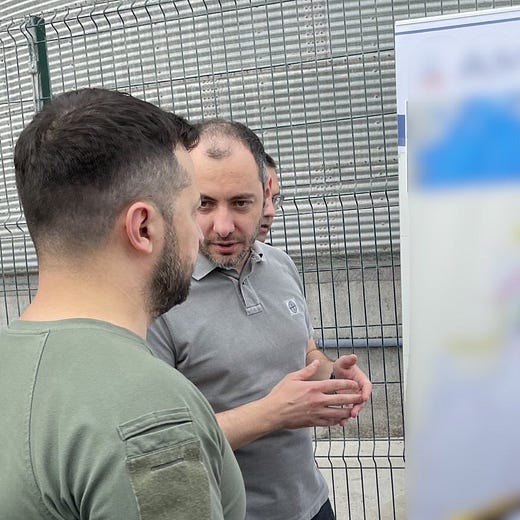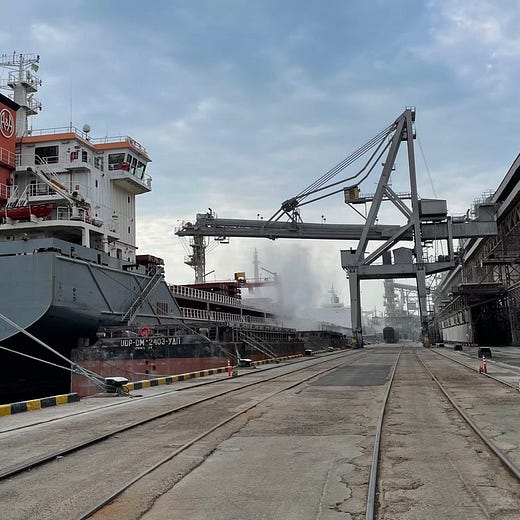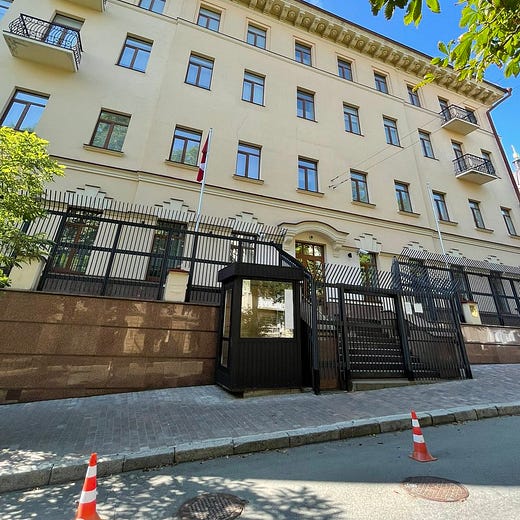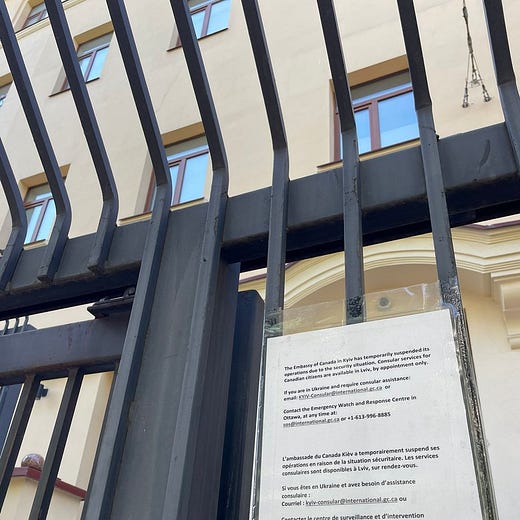Dispatch from the Front Lines: Happy birthday to us!
The Line starts year three. The limits of apologies. The weirdification of Alberta, and conservatives generally. A task force on task forces. Fertilizer, Ukraine, and more.
Happy Saturday, Line readers. We’ve got a loaded dispatch but first a few notes we want to put right at the top.
First, Line editor Matt Gurney had previously promised a final update on his journey to get his children new passports. He should’ve given the final update last week, but it honestly slipped his mind after having been on holiday. But as noted in his article detailing his trip to the passport office, he had been told his passports would be ready by the week of July 6. Passport Canada was as good as its word. Gurney travelled downtown on the sixth, observed a large line stretched around the building, with many folding chairs. But he was allowed to go right in because he had a pick-up slip. There were a few people in line ahead of him but he was back to his car, precious passports in hand, 20 minutes after arriving.
On another note, just three days ago, The Line passed its second birthday. It crept up on us. We knew it was coming but neither Gerson nor Gurney actually recalled on the day itself. So, happy belated birthday to us. We hope this third year is as good as the first two. Thanks so much to all of you for being part of this journey with us. If we have another year or two like the two we started with, The Line will truly grow into a fully capable independent Canadian journalism enterprise — and without taking a single dollar of advertising or taxpayer-funded government support. We are almost exactly halfway to all of our grandest goals. Thanks again for being part of this, and for those who joined us later on the journey, please check out the essay that launched it all.
And subscribe, if you haven’t already.
Please enjoy this week's Line editors' video.
The big story in this country this week was undoubtedly the visit by Pope Francis to Canada, who came here on what he called a “penitential pilgrimage” to apologize for the Catholic Church’s role in residential schools and the colonization of North America more broadly. Or something akin to that, actually. There has been predictable — we predicted it — disappointment and anger with the pope over the precise terminology of his multiple apologies, first in Edmonton, then in Quebec, then in the Arctic.
Your Line editors have observed the pope’s visit this week with detachment. We are not Indigenous. One of us was raised Catholic, before scooting off into lapsed atheism later in life. We mention this only to stress that we don’t have an emotional connection here. The pope’s visit doesn’t hit us where we live. It’s just news to us.
We don’t know if we have any particular wisdom to offer on the central matter of the pope’s apologies. We certainly agree that the Catholic Church, as an institution, should live up to all of its obligations, both moral and legal, regarding financial settlements and document disclosure. There is no reasonable argument against this.
On the substance of the apology itself, it struck both of us this week that apologies are hard, and forgiveness is harder. This is not a comment on Indigenous Canadians, or Catholics, or any of the specifics regarding the specific issue. It’s simply a comment on human nature. In our experience, both personally and also as observers of humankind, when someone has been very badly wronged, as an individual or community, they tend to fall into three broad categories.
There are those who cannot forgive, and fair enough. There are those who find a way to forgive and move on even in the absence of an apology, and God bless them, because we’re not sure we’d have the strength or grace. And then there’s that big, messy group in the middle, the ones who could forgive, and are trying to, but are struggling.
This is true in general, but certainly true of the pope’s apologies. We take no position on whether or not it was sufficient, we simply note that for some, nothing will ever be sufficient, and that’s okay. The pope was right to apologize, because apologizing was warranted and appropriate. It can’t suffice for everyone, and that’s the reality. We laud the pope’s willingness to make the trip.
What comes next, for those who were the intended recipients of the pope’s apology — those who can’t forgive, those who already had, and those struggling still? There is nothing we can say to or of the first group that will help, there is nothing the second group needs to hear from us, and to the third — we wish you good luck, healing and peace. Truly. We sincerely hope that anyone who has been suffering and was wounded in any way by the Catholic Church’s treatment of Indigenous peoples in Canada has found some peace and comfort in recent days.
We don’t expect miracles, pun very much not intended, but we hope it has brought some peace and some healing, and makes it easier, even if only just a little bit, to build better, happier lives.
We at The Line hate to beat on a dead horse.
Wait, that’s a lie.
Okay, we at The Line occasionally like to beat on a dead horse, but only when the horse isn’t dead. We’ve devoted two dispatch blurbs to date on Alberta UCP leadership candidate Danielle Smith, and specifically on her proposed “Sovereignty Act” which remains, despite her assertions to the contrary, dumb and poorly thought out.
So we know we should let it be for a week or two, but then Smith came out with this:
And that was after another winner: last week she hosted a quack … sorry, that was a cough, a COUGH. No, Smith talked health policy with a naturopath, an individual from a highly regulated and totally legitimate professional health practitioner in the province of Alberta, on her podcast. And made some fascinating remarks about cancer:
“Once you’ve arrived and got stage-four cancer and there’s radiation and surgery and chemotherapy, that is incredibly expensive intervention — not just for the system, but also expensive in the toll it takes on the body…But, when you think everything that built up before you got to stage four and that diagnosis, that’s completely within your control and there’s something you can do about that that is different.”
Smith later claimed she was misunderstood.
Well. Okay then.
Honestly, at this point we’re a month away from Smith claiming that the (((globalists))) are trying to prevent you from accessing ivermectin, which definitely cures COVID even though COVID may or may not be real.
We at The Line don’t pretend to know whether or not Smith actually believes any of this garbage. Our general impression of Smith has always been that she was a good talker, willing to be contrarian, and generally bright, though prone to gaffes and folly, especially on health policy. If that analysis holds, the best possible read on all of this is that she has either fallen down some pretty deep rabbit holes in the last few years, and lacks the intellectual scaffolding to climb her way out of them. That, or she’s totally full of shit, and is spouting this stuff because she knows that throwing up the bat signal will encourage enough crazy and disaffected Albertans to sign up to the party and secure her the UCP leadership.
After all, in its current dysfunctional state, it’s only going to take a few thousand members to call the win. Meanwhile, there is a significant chunk of the Alberta electorate who have grown despondent and alienated by COVID lockdowns and federal policy, which have made them feel helpless and unheard. These people are going to rally behind Smith, and they’re going to believe anything she tells them as long as what she tells them gives them hope and makes them feel good.
So the Sovereignty Act is nonsense; but at least it will stick it to the federal government, right? And if it takes a radical anti-lockdown premier to prevent my kids from being cohorted in junior high school, fine.
That’s the logic.
One of the UCP leadership hopefuls has figured out the formula. All she has to do is show up with a big red nose and let her ass hang out in chaps. The only thing any of the other contenders are talking about is how silly the clown looks in assless chaps*, ignoring the fact that they’ve just handed the side show the narrative. October is going to come along and the clown is going to be crowned rodeo queen and the rest of the contenders are going to be stuck looking around and wondering what the hell happened.
Well, as silly as Smith is, none of you all managed to come up with anything better, did you? None of the other members of the UCP — almost all members of Kenney’s former cabinet and ostensibly skilled in politics — was able to wrest back the narrative or set any of the agenda. Since this race began, it’s been Smith, Smith, Smith.
The only other leadership contender who seems to have grasped the problem is Travis Toews, and his solution is to create targeted tariffs against areas deemed hostile to Alberta. Tariffs! Never mind that such a proposal would chip away the whole point of being in an economic federation, increase cost of goods for Albertans, and risk precipitating an inter-provincial trade war.
Good grief. We think it may be time to acknowledge that Alberta’s conservatives are bad at politics. If none of these guys can win against Danielle Smith, they should wrap it up and retire in shame.
*Yes, we’ve been informed that all chaps are assless. But, come on. “Assless chaps” is far more evocative as a term. And yes, we’ve also been told that it’s pronounced “shaps.” Assless shaps.
Look, we at The Line know what you readers really come here for: The wit? Nay. The misanthropy? Certainly not. The grim read of our fair country's capacity issues in the face of apocalyptic changes and challenges ranging from war and famine to mounting natural disasters and refugee crises? Well, maybe a little.
But what you really want is ... sophisticated analysis of Canadian agricultural policy.
Yes, fair readers; today we're talking about fertilizer. Which, to be totally fair, manages to tap into every extant grievance and anxiety already mentioned at the moment.
So, let's begin.
We rather expect that most of you will have heard a little about this particular issue already, and have been meaning to delve into it, eventually, when the news cycle stops bombarding you with other pressing issues. We're sparing you the trouble.
In 2020, the federal government announced a plan to reduce greenhouse gas emissions arising from fertilizer application by 30 per cent below 2020 levels within the next decade. The targets, then fairly vaguely spelled out, have been a subject of considerable consternation among farmers in the wheat belt ever since. However, as the feds moved into a consultation process, set to end by the end of August, it's now become clear that those targets are a little more set in stone than they had previously feared. Further, the "consultation" process is looking increasingly tokenistic.
"The commitment to future consultations are only to determine how to meet the target that Prime Minister Trudeau and Minister Bibeau have already unilaterally imposed on this industry, not to consult on what is achievable or attainable," according to a press release sent out jointly by the Alberta and Saskatchewan agriculture ministers last week.
Why does this matter? Well, firstly because these emissions targets are coming on top of tariffs placed on chemical precursors to fertilizer coming out of Russia. And further because according to industry lobbyists and many farmers themselves, it's not going to be possible to meet these kinds of emissions targets without significantly reducing fertilizer use — which is already efficiently applied owing to the fact that the stuff is expensive.
The meat of it (ha!) is that if we reduce fertilizer use further, there is significant fear that we will cut into food yields, just as the world's growing population is facing a possible famine thanks to war. It's not like these concerns are temporary, either. In the long run, climate change is only going to add to food insecurity; and Canada may be well-positioned in a changing climate to address the global food supply.
And, yeah, all of this is very ironic. Of course we should be doing all we can to cut emissions, but, perhaps — just hear us out, here — given the broader geopolitical realities, agriculture is not the most obvious or well-placed target for those emissions cuts. Especially considering Canada still accounts for a very small fraction of global greenhouse emissions overall. (Yes, we know our per-capita emissions are high. That's the unfortunate consequence of living in a very cold, poorly populated expanse. However, our actual population remains low. These two facts are not coincidences!)
Now, if we were going to give the federal government some benefit of the doubt, we'd point out that we're still in a consultation process. We'd also further point out that if the government wanted to reduce agriculture emissions, there are probably some smarter ways to go about it — equipment upgrades, for example. Investments in soil testing could go a long way to helping farmers apply nitrogen more efficiently, which could help them increase yields while maintaining profits. Win-win!
Yet, from what we've seen from this government since the last election, we're not betting on sensible, win-win solutions. Farmers in the Netherlands have been so put out by similar climate-change inspired emissions cuts that they've engaged in convoy-like protests themselves. Further, we suspect the Trudeau government salivates at the prospect of a bunch of another round of spitting-mad, truck-driving farmers rolling into Parliament to protest climate change policies. Every pissy article in the Federalist is a win to this cabinet.
If you’re angering the right people, you’re winning, right?
And how do we imagine arcane policies like this are going to play out internationally in the next three to nine months, if we witness more and more developing countries closing borders to grain exports and significant swathes of the developing world look set to starve? How well are these climate-change policies going to sit against real, hard geopolitical realities like a frozen Europe in winter or significantly curtailed industrial production in Germany, leading to further supply chain issues and economic recession?
If this government is not careful, they're going to drag a lot of the progressive movement — and its genuinely very noble ideals — along with it. This is a government that appears to have said "fuck it," retreating ever deeper into self-reinforcing ideological bubbles as the world decides it has much bigger problems than those that the Trudeau government seems able to address. To put it bluntly, how are pious climate-change goals going to look if they have to be measured against piles of emaciated bodies in the developing world? Because that’s the danger. Nobody in Canada is going to starve.
Contrary to all appearances, we at The Line don’t actually enjoy spending a good chunk of our waking hours and productive energy hating on the Liberal government. We like it even less in the summertime, when we would much rather be working on little more than our tans. But alas, a deep profound cynicism is forced upon us, over and over again, by the actions and omissions of the powers that be in Ottawa.
For what’s baking our beans this week, let’s start at the end, with a surprise visit to Odesa on Friday by Canada’s ambassador to Ukraine, Larisa Galadza. Along with the ambassador from Turkey and other G7 countries, Galadza was there to “show support” to Ukraine president Zelenskyy’s efforts to get grain shipments out in the face of Russian missile attacks on the port.
It is entirely possible that it’s all just a coincidence. Maybe this visit has been quietly in the works for a while. But the timing is sus, considering that earlier in the week, Global News journalist Ashleigh Stewart tweeted some photos from outside the Canadian embassy in Kyiv that showed the building completely padlocked and shuttered, with a sign on the gate saying if you’re looking for consular assistance, head to Lviv (a city 450 km to the west near the border with Poland).
This struck Stewart as a bit odd. After all, back in May, Justin Trudeau — flanked by Chrystia Freeland and Mélanie Joly — had made a high profile visit to Kyiv to re-open the embassy, which had been closed (along with those of many other countries) shortly before the Russian invasion of Ukraine in February.
The re-opening itself was very typical of Canada, and very typical of Trudeau. We reopened later than many of our peer countries, but not so very late that it was getting weird. It was theatrical, optimized for promotion on this government’s endlessly self-fawning social media accounts. But the cynicism many of us felt at the time was blunted somewhat by the fundamental rightness of it, and the fact that the prime minister of Canada was finally making a public display of support for Ukraine. At a news conference with Zelenskyy, Trudeau had strong words for Russia, declaring that “Canada will support Ukraine as you seek justice for your people who Russia is killing and brutalizing,” He added: “This morning, Ambassador Larisa Galadza and I raised the Canadian flag at our embassy here in the capital. She and her team will resume operations here in Kyiv.”
So Canadians — and frankly, any reasonably competent speaker of the English language — would have had every reason to think that the embassy was open for business, or imminently would be. But it turns out that Canada probably never intended to re-open the embassy. After all, Trudeau did not actually say “Galadza will resume operations at this here building, which is our embassy, which is in Kyiv, in front of which I just raised a flag.”
Assuming that the embassy was now open, with the ambassador working inside of it, is the sort of thing you would naturally infer from the ceremony and Trudeau’s remarks. And of course, Trudeau was more than happy to let people think that was the case. But the real story is, the embassy never reopened. The ambassador may be in Kyiv, but she is working at an undisclosed site. Consular and other services, such as help with immigration, are being provided in Lviv or in Poland.
Readers of The Line can make their own judgments about Canada’s bona fides here and how much benefit of the doubt they are willing to give Trudeau. But we’d like to just make a few comments:
First: There are reasonable arguments to be made for keeping the embassy in Kyiv closed. The country is at war, Russian missiles are raining down across the country, hitting schools, hospitals, churches, residential buildings etc.; there is no reason to think the Russians would stop at destroying an embassy, even if they could control where their crappy missiles actually land in the first place. It’s a risk judgment thing. You could make a case for keeping it closed. But: it’s not a case Trudeau ever made, to Canadians or to Ukrainians. Instead, he made a big show of opening — sorry “opening” — the embassy, got the photos for the ‘gram, and never followed up. Shame on anyone who ever assumed it was going to be otherwise.
Second: This episode might help explain why Zelenskyy was so quick to tee off on Trudeau over the return of the Siemens turbine to Germany a few weeks ago. We are big supporters of Zelenskyy here, but his rage at Trudeau seemed a touch strong, given that Canada had made itself out as one of Ukraine’s closest friends and staunchest allies against Russia. Maybe Zelenskyy had good reason for thinking that Canada wasn’t being nearly as supportive as Trudeau was making himself out to be.
The truth is that ever since the Russian invasion began in late February, Canada has repeatedly shown itself to be a false friend to Ukraine. Whether it’s the sluggish delivery of aid and weapons, the diplomatic attendance at the Russian ambassador’s garden party, the turbine scandal, the sheer lack of focus and commitment, and, now, this disgrace over the bullshit embassy reopening.
Which brings us to our third and final comment: Can we just say that this is so depressingly on brand for this Instagram-addled government?
One final note for you this week, and it flows naturally from the one above. We should note at the outset that full credit for the heavy lifting here goes to reporter Jacques Gallant of the Toronto Star. About a month ago, in response to damning stories about dysfunction across much of the federal public service, primarily but not exclusively at passport offices, Prime Minister Justin Trudeau announced a new cabinet task force that would commit itself to improving Canadians’ experience when seeking government services.
The response to this announcement here at The Line was a good, hearty chuckle. The announcement was very close to tipping over into accidental self-parody: the current brand of Canadian big-L Liberal is very, very good at political optics and branding, and not particularly good at policy implementation. Responding to genuine public anger over bureaucratic dysfunction with an announcement of a new federal task force is maybe not the best possible distillation of seven years of such nonsense into a single announcement, but we honestly can’t imagine a better one.
When that announcement was made, we made a mental note to follow up on it this summer and see how it was going. Gallant and the Star beat us to the punch, and we are not above simply citing (with approval) their hard work. As the Star reported, not only has there been no update on what the task force is doing since it was announced, the union that oversees workers at Canada’s passport offices told that the paper that it has had no contact with the task force. The union overseeing workers at Service Canada has had one meeting, and was told to expect a followup from the task force. There has been no followup.
When the Star asked for comment, what they got back from the task force was a slightly reworded copy and paste of the task force’s original announcement.
This is absolute perfection. Seriously. Ten out of 10, guys. We don’t even really need to editorialize. The task force on customer service excellence accomplishing nothing after more than a month and resorting to recycling its own initial press releases says it better than we could realistically hope to.
We will simply end with these two thoughts. As cynical as we are prepared to be, particularly as regards our current crop of federal Liberals, we don’t want the reader to think that we are cynical about their motives. The boys and girls at PMO can play nasty politics with the best of them, and we don’t hesitate to call that it when we see it, but in this particular instance, we do not default to assuming purely political motives to the task force’s announcement and subsequent utter uselessness. You all know the joke about everything looking like a nail to a hammer. Your Line editors strongly suspect the reason many of our federal services are struggling is because the leadership, both elected and bureaucratic, of this federal government are truly made up of people who very honestly and sincerely believe that more and more task forces and committees reviewing processes is necessary to improving customer service. We would say it’s more of the problem being offered as a solution, but we accept as totally sincere the apparent belief of this federal government that a necessary precursor to getting our various levels of federal public-service bureaucracy functioning better is an additional level of federal public-service bureaucracy.
We think it’s nuts, but we realize that they don’t. And we know that they are probably baffled that we don’t see it the same way they do.
And our final point? We have been saying repeatedly here of late that we do not think many of our governing and political elites understand the public mood, and where it could lead if we are not very, very careful. This summer’s announcement and instantaneous ineffectiveness of a federal task force on improving the workflow of a variety of other federal task forces — a.k.a. departments — has been added to our list of reasons why we think these guys are whistling past the proverbial graveyard.
When they finally do clue in, you know what they’ll do too, right? Strike a task force. When you can only do processes, never outcomes, you’ll layer on process atop process ‘til the cows come home, because you don’t know what else to do, and probably can’t learn.
Round Up
Okay! That’s it for us! Let’s have a fantastic third year here at The Line.
The Line is Canada’s last, best hope for irreverent commentary. We reject bullshit. We love lively writing. Please consider supporting us by subscribing. Follow us on Twitter @the_lineca. Fight with us on Facebook. Pitch us something: lineeditor@protonmail.com











Great weekly summary, I especially enjoyed the dissection of the Ukrainian Embassy story. It is quite remarkable how the Liberal marketing department can burn the jet fuel and tie up the Prime Minister and two senior cabinet ministers for a few photos taken thousands of miles away in a war zone.
On to fertilizer:
Regardless of where urbanites stand on climate change/climate action, understand the dynamics of fertilizer usage on a modern farm operation. Fertilizers are needed to make budgets work and also to make the production aspects function. Lenders want to see a business case that points to profits. The profits provide the ability for farmers to upgrade to the newest technologies for fuel efficiency and fertilizer applications. On the production side, reducing fertilizer needs by 1/3 is like running power tools starved for electricity or baking bread with less yeast.
I agree with the Line, that the Liberals ARE HOPING that another round of hillbillies take to the streets across Canada and inconvenience and anger urban people who are happily riding the climate action bandwagon because they have little skin in the game.
“Investments in soil testing could go a long way to helping farmers apply nitrogen more efficiently, which could help them increase yields while maintaining profits.”
Good lord, do you not think farmers have been doing soil testing for like decades? If you can’t comment intelligently on a subject don’t bleeping bother. It’s literally insulting to the agricultural industry. Extremely disappointed as a subscriber.